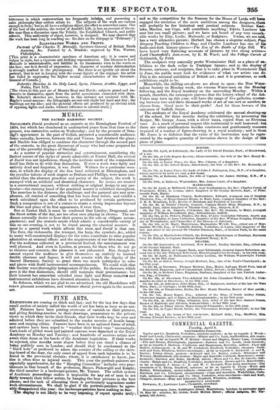MUSIC.
THE SACRED HARMONIC SOCIETY.
NEuxostat's David, produced as an oratorio at the Birmingham Festival of 1834, but which has slumbered in undisturbed peace from that time to the present, was restored to notice on Wednesday; and by the promise of Stan- dies appearance in the part of Goliah, attracted a considerable audience. Some casualty, however, between this and Vienna, had detained the giant; and Machin was obliged to continue the character through the second part of the oratorio, to the great discontent of many who had come prepared for one of the powerful.displays of Staudigl.
As a matter of popular attraction and entertainment, considering the limited nature of the styles of music admissible at Exeter Hall, the revival of David was not injudicious, though the intrinsic merit of the composition itself has little to do with that distinction. If ever a work were fairly and entirely dead and forgotten, it was David. Written for a particular occa- sion, in which the display of the fine band collected at Birmingham, and the peculiar talents of such singers as Brahamand Phillips, were more con- sulted than the abstract grandeur and poetry of the subject, the work is stamped with an artificial and theatrical character. Its scenes are treated in a conventional manner, without striking or original design in any par- ticular—the running hand of the practised master is exhibited throughout. The marches in the distance, the challenge, and the pastoral airs and sym- phonies, all remind of something that has been done before, and exhibit a work calculated upon the effect to be produced by certain performers. Such a composition is not of a nature to create a strong impression beyond tini'tinie and place of its first appearance, if even then.
But at Exeter Hall, it must be confessed that Lindley, Dragonetti, and the finest artists of the day, are too often seen playing in chorus. The au- dience naturally desire to hear their powers in the solo or obligato accom- paniment; and the oratorio music which admits a considerable variety of this on one evening, is not to be found among the classical masters. It must be a special work which affords this treat, and David is that one. The flute, the violoncello, the trumpet, the harp, the cymbals, &c., added to many well-constructed displays for the voice, contribute to raise popular admiration at unusual effects and the acquirements of our first-rate artists. For the audience collected at a provincial festival, the entertainment was well planned. And even in London, at present, for those who do not go to theatres and concerts, the pleasure is not exhausted. But, though we cannot expect the audience to give themselves up entirely to learned double choruses and fugues, it will not consist with the dignity of the Sacred Harmonic Society to grant them too much indulgence in solos and pieces with florid instrumental accompaniments. We could wish that this Society were thoroughly independent of the public. Its choruses, which gave it the first distinction, should still maintain their preeminence: but their interest has somewhat subsided since light and fliinsy oratorical and instrumental exhibitions have diverted attention from them.
In Solomon, which we are glad to see advertised, the old Handelians wffi renew pleasant associations, and welcome choral power again in the ascend- ant.


























 Previous page
Previous page